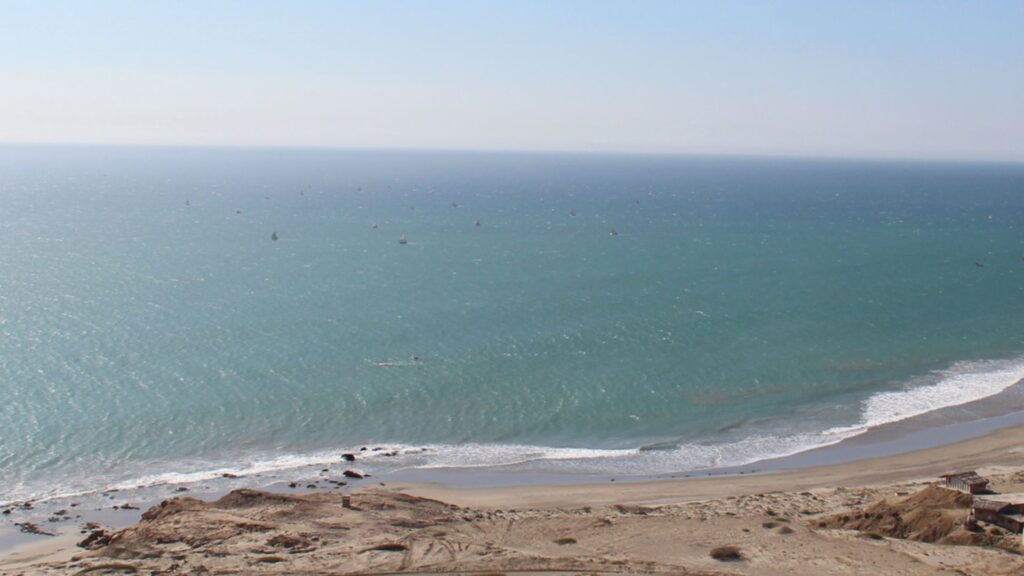Cabo Blanco, a small fishing village on the northern coast of Peru, holds a unique place in maritime history. Once a legendary destination for sport fishing—attracting figures such as Ernest Hemingway—it is now at the center of an ambitious initiative to promote regenerative tourism, marine conservation, and climate-positive economic development.
Through the efforts of Inkaterra Hotels, a leading Climate Positive Certified hospitality group, and Inkaterra Asociación, a nonprofit organization dedicated to biodiversity research and conservation, Cabo Blanco is transitioning towards a nature-positive future—one that restores ecosystems, empowers local communities and creates long-term economic value through sustainable tourism.

A Legacy of Sport Fishing in Cabo Blanco
During the 1950s, Cabo Blanco gained international recognition as a premier destination for big-game fishing, particularly for black marlin, with record-breaking catches exceeding 700 kg. However, decades of overfishing, habitat degradation, and climate change have led to a dramatic decline in marine populations, threatening both the ecosystem and the livelihoods of local fishing communities.
To counteract these impacts, conservation initiatives have been set in motion to restore marine biodiversity while ensuring sustainable tourism remains a viable economic driver. One of the most significant steps toward this goal is the proposal for Peru’s first marine reserve, which aims to protect critical habitats, replenish fish populations, and regulate responsible fishing practices.
Sustainable Sport Fishing: A Regenerative Approach
While sport fishing remains a core attraction in Cabo Blanco, adopting regenerative fishing practices, such as catch-and-release policies, ensures that tourism supports, rather than depletes, the region’s marine resources.
Key Benefits of Sustainable Sport Fishing:
- Restores marine biodiversity by preventing overfishing and supporting species recovery.
- Maintains healthy fish populations, ensuring ecological balance and long-term economic benefits.
- Engages local communities in conservation efforts, fostering economic incentives for sustainability.
- Attracts responsible travelers who contribute to conservation initiatives and sustainable development.
Regenerative Tourism and Marine Conservation in Cabo Blanco
Beyond fishing, Cabo Blanco is evolving into a hub for regenerative tourism, where visitors actively contribute to the ecosystem’s health rather than merely minimizing their impact. Inkaterra Asociación, in collaboration with scientists, conservationists, and local communities, is implementing nature-positive solutions to rebuild degraded marine and coastal environments.

Regenerative Tourism Initiatives in Cabo Blanco:
- Marine habitat restoration: Efforts to protect and restore seagrass meadows, coral reefs, and mangroves, which serve as breeding grounds for marine species and act as powerful carbon sinks.
- Eco-friendly sailing and marine wildlife observation: Low-impact boating and guided excursions allow visitors to experience the region’s rich biodiversity, from dolphins and sea turtles to whale sharks.
- Carbon sequestration and climate resilience: The protection and restoration of blue carbon ecosystems (mangroves and coastal wetlands) enhance carbon capture while safeguarding communities from coastal erosion.
- Educational workshops and community-based tourism: Local fishermen are trained in sustainable fishing techniques and ecotourism services, ensuring that conservation benefits are equitably shared.
- Plastic waste reduction and circular economy initiatives: Programs focused on reducing single-use plastics, promoting responsible waste management, and upcycling marine debris are being developed in partnership with the local community.
Inkaterra’s Climate and Nature-Positive Impact
As a Climate Positive Certified company, Inkaterra Hotels goes beyond sustainability by actively removing more carbon from the atmosphere than it emits. In Cabo Blanco, its impact is being realized through:
- Regenerative conservation projects that restore marine and coastal ecosystems.
- Scientific research and biodiversity monitoring, ensuring data-driven conservation strategies.
- Integration of renewable energy solutions to power ecotourism infrastructure.
- Support for carbon offset initiatives, including reforestation and blue carbon projects.
By aligning with global climate goals and nature-positive principles, Inkaterra Asociación and Inkaterra Hotels prove that tourism can be a force for environmental regeneration rather than exploitation.
A Scalable Model for Global Conservation
The transformation of Cabo Blanco into a regenerative tourism destination serves as a blueprint for coastal communities worldwide. By combining scientific research, sustainable economic development, and active ecosystem restoration, this initiative demonstrates how tourism can be reimagined as a tool for global climate action and biodiversity protection.
How to Support Regenerative Tourism in Cabo Blanco:
- Choose eco-certified tour operators that adhere to sustainable fishing and conservation guidelines.
- Participate in educational and conservation programs, such as monitoring marine biodiversity or habitat restoration.
- Advocate for the creation of marine protected areas to ensure long-term conservation.
- Support businesses and organizations that promote regenerative tourism and climate-positive solutions.
- Spread awareness about the importance of nature-based solutions and the role of tourism in climate resilience.

Conclusion
Cabo Blanco is undergoing a profound transformation—from a historic fishing hotspot to a global leader in regenerative tourism and conservation. By prioritizing marine restoration, responsible tourism practices, and community engagement, this initiative ensures that future generations can continue to experience this iconic destination’s natural and cultural richness.
As the world moves toward more climate-resilient and nature-positive tourism models, Inkaterra’s work in Cabo Blanco is a powerful example of how travel can catalyze ecological regeneration and socio-economic prosperity.
For more information on regenerative tourism and conservation efforts, visit Green Initiative and contact us.

